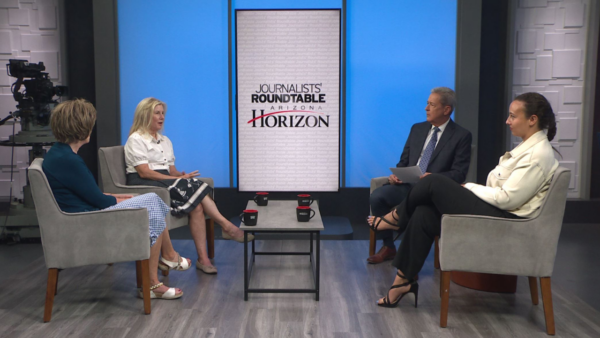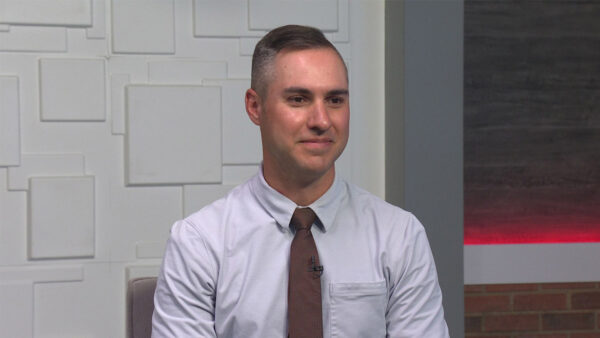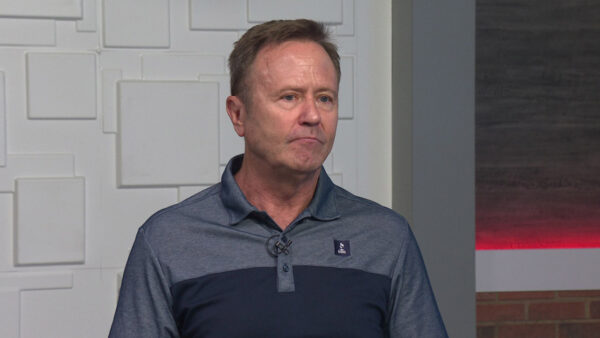State lawmakers help a press conference today on SB 1322. Supporters say the bill will save taxpayer money by requiring Arizona’s largest cities to seek competitive bids for the delivery of certain city services. Senate Majority Leader Scott Bungaard and Phoenix City Councilman Sal DiCiccio explain.
Ted Simons: State lawmakers held a press conference today on senate bill 1322, supporters say the bill will save taxpayer money by requiring Arizona's largest cities to seek competitive bids for the delivery of certain city services. Here to explain is senate majority leader Scott Bundgaard, and Phoenix city councilman Sal Diciccio. Good to see you both. Thanks for joining us. Let's fine tune here. What exactly does this bill do?
Scott Bundgaard: Basically the intention of the bill is to create some competition for city services. At this point we believe that the private sector can better deliver a lot of the services that are currently provided by cities and to do it more effectively, more efficiently, and create a whole lot of jobs in the private sector in the process.
Ted Simons: Similar question, different angle, why is this necessary?
Sal DiCiccio: Well, what it does is it puts a billion dollars into the economy. It allows small business owners to compete for services that have never been able to compete before. It opens up services, providers, innovative ideas; it will bring in new ideas, refreshing ideas into local governments. What it does it is looks at every function of government, every function at the local level that's over $50,000, requires those cities to competitively bid that out. Does not require the cities to take the bid, but what it does is allows -- it requires them to bid it out, so you have new ideas, different ways of delivering that same service. We believe this will create a national model for cities, states, all around the country, because no one has really done this. One of the things we talked about earlier is that it looks at things in a vertical way. So we all agree that you want to deliver police, right? Under police you've got multiple functions of government in order to get that police officer on the street. One of those is automobile repair. So do you want to prepare the automobiles, or do you think it's better for us to bid those services out? And it looks at every single layer under the function of putting that police officer on the street, and whether or not if that could be competitively bid.
Ted Simons: The idea of cities, we're talking originally 500,000 and up, but that's changed?
Scott Bundgaard: It's changed to 200,000 and up. And I think that's about seven or eight of our larger cities. SO it's a great place to start. It's more like a pilot project, and we know that within some of the larger cities there's quite a bit of administration and efficiency that can be achieved through this legislation.
Ted Simons: Give us another example of how this would work. It sounds like it's a good idea for information gathering, but if you don't mandate it, what's going on here?
Scott Bundgaard: What we're trying to do with the legislation is that -- create a statewide policy on this matter. So we're starting with seven or eight of these cities, and hope to take it statewide. The goal is to create more jobs, to create more efficiencies in government, to let taxpayers know that they're getting some value for the tax money that they're spending. Ultimately this will extend out over even pension savings for instance. So we've read in the newspaper and heard a lot in the media about the cost of pensions, the defined benefit contribution -- defined benefit system. So when we roll this out, if a private businesses replace the public sector, then we're going to achieve long-term savings, substantial savings. So we're just scratching the surface with this.
Sal DiCiccio: It creates a lot more transparency, is what it does. It puts everything under the microscope. The reason that 150,000 threshold is put in there is it allows smaller businesses to compete, and large ones will be able to do the bigger projects. The smaller ones will be done by smaller business. It doesn't require any city to take the bid. It just allows -- requires them to bid everything out. The other thing it doesn't do it is doesn't bid out police, fire, strategic functions, judges, tax collections. There's certain functions that are strategic that it does not bid out that you want to maintain by that local government.
Ted Simons: So if it doesn't require the cities to take the bid, is it more of an idea where I've got a better idea, the city council hears my idea, they don't necessarily take my bid, they don't necessarily take my job, but they say, maybe we can do something differently or better.
Sal DiCiccio: It creates more ideas to come in. But it also -- at some point the cities will be compelled to take those bids. If they're better bids by far, then they're going to be beholden to the taxpayer. Right now there's only one way much delivering that service, and that's through local government. There are multiple ways of delivering service better smarter and more efficient.
Ted Simons: Are there multiple ways as far as oversight? What kind of managerial oversight are we talking about here?
Scott Bundgaard: The oversight is going to come largely from the taxpayers and small businesses challenging the status quo. Because as the process currently exists, you've got a bureaucracy that's set up to protect the bureaucracy. Starting with the procurement process, an entity can actually create a request for proposal that allows them to essentially sole source or sole select a contract. They've also -- they'll also be able to narrow -- be very selective about the contractors that they will issue bids to. So that -- so when you limit competition like that, then you reduce transparency, reduce accountability, you reduce the ability to achieve cost efficiencies, and that's what we're really trying to do, is use taxpayer money more wisely, and to create jobs in the process. And as Sal mentioned, this has an opportunity of creating a billion dollars in economic opportunity here for the state of Arizona.
Ted Simons: But if you have -- take the opposite side. If you have four different companies doing different things for one particular division of the city, who has the oversight? Who makes sure these four companies are doing what they're supposed to be doing?
Sal DiCiccio: That's what your managers do. It's done to the RFP process as well. What you do is you write in there specific standards they have to do, they don't abide by them, you fire them, just like the private sector. This brings business principles into government. No different than people run their operations, whether it be a small business or a large business. What it does, it will be the first model to say that government has to be run and look at functions of government just like would you in business. And it creates the transparency that the Senator Bundgaard was talking about because now it's all open. If they don't take those bids, and let's say there's a savings of $10 million, and the city decides not to take that, that council member that voted against that is now beholden to the taxpayer. It requires the taxpayers to be active.
Ted Simons: Are these council members, are these city leaders, aren't they beholden now? What would that change?
Sal DiCiccio: They are, but the system is geared to protecting itself, Ted. I've been in local government, local government, at least in the city of Phoenix, is literally geared to protect their own bureaucracy and they do not bring any innovative ideas that this will do it. This will bring it into the large-scale to even from the lowest level to the largest level where people are in business are saying, hey I can deliver that service better. Let me give it a shot at that.
Ted Simons: For those who are saying, ok we have a business, let's say we're not happy with the business, we want them out of there. Right now we have city leaders who aren't doing the job. We want them out of there. Is it better -- you got your city leaders, you know who they are, you know how to get rid of them, but if you have all sorts of smaller companies doing all sorts of different things, oversight, what do you do?
Scott Bundgaard: The elected officials are accountable, but in the case of local governments, city managers are accountable typically with the city council. But whether you're at the local level or at the state level, the point is that the bureaucracy works to protect itself. Sal had raised two different issues that happened at the city of Phoenix, where they spent $34 million on repairing their own vehicles. As opposed to competitively bidding that. They also dot same with their printing services. These are two areas where government doesn't do a better job than the private sector. They're a private sector individuals out there who will do a fantastic job, and create jobs, and save the taxpayer money in the process.
Sal DiCiccio: This breaks the special interest hold on local governments is what it does. Literally there was a special interest hold by labor groups that control what happens at the local level. What this does is it says, well wait a second, we want to see what the best way of providing that service, is it is better, it is smarter, more efficient, and this requires to us do that.
Ted Simons: Last question real quickly, if Ted's automotive supply has a better idea but I know going to the city isn't necessarily going to win me the contract, you may just take my idea and run with it in another direction. What makes Ted's automotive supply want to go there?
Sal DiCiccio: Well if you're that much better, I would be surprised if a local official did not vote for that. Sooner or later the taxpayers will end up revolting if that was the case. The reason we did the 50,000, is it requires multiple bids, and the reason we picked the 200,000 threshold, those cities have the infrastructure in place to do this and do it efficiently.
Ted Simons: Alright gentlemen, we got to stop it right there. Thanks for joining us.
Scott Bungaard:Senate Majority Leader;Sal DiCiccio:Phoenix City Council;























